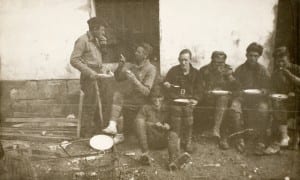Sex and the Somme
By Ben Stevens H P Stevens, on 26 June 2014
As the First World War centenary commemorations continue apace, there is a risk that inconvenient truths about the war will be quietly airbrushed from the official record.
One particular area that some may like to ignore is the use of brothels by British troops or ‘Tommies’ while in France and Belgium.
Dr Clare Makepeace (UCL History) made it the focus of her lecture ‘Sex and the Somme’ on 18 June, which was the first in a new series of First World War –themed Lunch Hour Lectures on Tour at the Guardian’s London offices.
She began by explaining how when the Tommies set off, each one was dispatched with a message from Lord Kitchener folded into their pay books. In it, he reminded them that the honour of the British Army depended on their conduct and warned them to “be on guard against excesses” especially “temptations both in wine and women” and to “avoid any intimacy”.
A VD epidemic
His words fell on deaf ears, though – as, over the course of the war, there were 400,000 cases of venereal disease and, in 1916, one in five hospital visits were VD-related.
According to a medical history of the time, when the British medical authorities conducted an experiment in one street in Le Havre to limit infection, they recorded 171,000 men visiting brothels in a 57-week period alone.
So why was there such a disparity between Kitchener’s trenchant words on the matter and the reality? Dr Makepeace argued that it was the result of a number of factors.
A daily requirement
One was the prevailing culture of the British Army before the outbreak of war. Members of the regular army were strongly discouraged from getting married, yet the Victorian idea that men required daily intercourse was widespread – despite several medical groups debunking the idea.
As a result, sex and women were recurrent topics of conversation and the professional soldiers in the ranks often encouraged conscripts and volunteers to visit prostitutes when they arrived in France and Belgium.
For some, having sex with prostitutes was part and parcel of the war. Lieutenant R. Graham Dixon wrote in his memoirs: “We were not monks but fighting soldiers and extraordinarily fit… with an abundance of physical energy.”
Another factor was that was that some Tommies visited the brothels simply as a refuge from the slaughter and imminent death. As Robert Graves observed in Goodbye To All That, many of them “stood a good chance of being killed within weeks anyhow… They did not want to die virgins”.
Official ambivalence
Also, for all Kitchener’s fine words, the official British line on soldiers visiting brothels was confused and ambivalent to say the least.
For instance, there was no punishment for receiving VD – only concealing it – yet, for the first two years of the war, relatives were informed when a diagnosis of VD was made.
This policy was then swiftly abandoned when conscription of married men was introduced – as extramarital sex soon became widely tolerated and even considered a necessity.
Similarly, the hundreds of licensed brothels across France were only officially made out of bounds from 1918 and, prior to that, there was no reason to be furtive when visiting them.
Indeed, Corporal Jack Wood wrote in his diary that the ‘Red Lamps’, as they were often known, attracted a crowd “like a football cup tie in Blighty”.
The class divide
The truly astounding aspect of the British approach, though, was the attitude taken to the ‘Blue Lamp’ brothels.
These offered comparative luxury and were frequented by officers – from both sides. In other words, Dr Makepeace said, British officers were more willing to share prostitutes with their German counterparts than their own men.
From her research, she has also found evidence that contracting VD was not seen as wholly undesirable: some Tommies sought it to avoid the frontline.
As treatment could take 30 days, it provided quite a respite from the fighting and so those prostitutes known to have contracted VD were often paid more money as a result.
Welcome complexity
Ultimately, you could ask why it’s worth studying this aspect of the war in the first place – particularly as no first-hand accounts seem to exist from the prostitutes themselves.
In Dr Makepeace’s view, our official centenary commemorations avoid the complexity of the soldiers’ experience – and the fabled Christmas football match of 1914 epitomises this. It’s a symbol of hope among all the horror and yet there is no concrete evidence that such a truce ever took place.
So, while the extensive use of brothels by British troops may be an uncomfortable truth to accept, by complicating the terms in which we think of First World War, it may lead us towards a greater insight into what it meant to be a British man at war.
Watch the full lecture below:
 Close
Close


